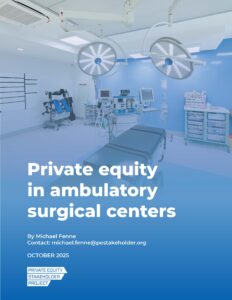
Private Equity in Ambulatory Surgical Centers
October 7, 2025
Private equity firms are reshaping outpatient surgical care through consolidation, leveraged buyouts, and joint ventures with major health systems. This PESP report examines how those strategies impact costs, transparency, and competition across the fast-growing ambulatory surgery sector.
Private Equity in Ambulatory Surgical Centers
How Wall Street’s quiet consolidation is reshaping outpatient care
The Private Equity Stakeholder Project’s research brief, Private Equity in Ambulatory Surgical Centers, examines how private equity firms have become dominant players in the $30 billion outpatient surgery market. Authored by PESP researcher Michael Fenne, the report traces how leveraged buyouts, joint ventures, and stealth roll-ups are transforming care delivery—and raising red flags for patients, providers, and regulators.
Ambulatory surgery centers (ASCs) now handle more than 60% of outpatient procedures in the U.S. Marketed as lower-cost, convenient alternatives to hospitals, many have instead become vehicles for Wall Street consolidation. The brief finds that private-equity-owned ASCs often raise prices by nearly 50% within a few years, without improving patient outcomes.
“These investments may bring many of the same risks we’ve documented across other areas of healthcare—debt burdens, short-term cost-cutting, and ownership webs that obscure accountability,” said Michael Fenne, senior policy researcher at PESP.
Case Studies in Consolidation
AmSurg / Ascension – After a $9.9 billion leveraged buyout by KKR and subsequent bankruptcy, AmSurg was acquired by nonprofit giant Ascension for $3.9 billion—illustrating how private-equity-built networks are being absorbed by major health systems.
Regent Surgical Health – Backed by TowerBrook Capital and Ascension Capital, Regent forms joint-venture ASCs with nonprofits such as Mass General Brigham and the Cleveland Clinic.
UnitedHealth / Optum – Expanding its outpatient footprint by acquiring private-equity-assembled platforms including PE GI Solutions, OrthoAlliance, and U.S. Digestive Health.
Surgery Partners (Bain Capital) – The nation’s third-largest ASC operator; Bain Capital has maintained a controlling stake and sought to take the company fully private.
By the time regulators review major mergers, much of this consolidation has already taken place through smaller, unreported deals—a pattern of “stealth consolidation” that undermines competition and transparency.
A Call for Oversight
The report concludes that stronger disclosure rules and antitrust oversight are urgently needed to monitor private equity’s expanding footprint in outpatient care. Without reform, ASCs risk becoming yet another venue where Wall Street dictates the terms of healthcare delivery—driving up costs while leaving communities with fewer choices.

